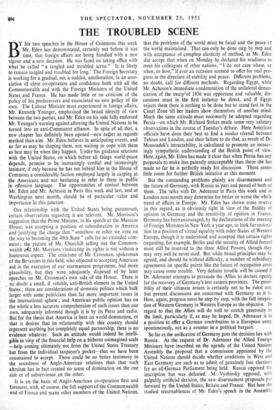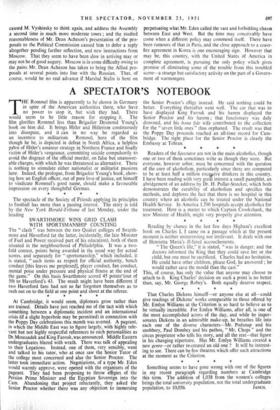THE TROUBLED SCENE
BY his two speeches in the House of Commons this week Mr. Eden has demonstrated, certainly not before it was time, that foreign affairs are being handled with a new vigour and a new decision. He was laced on taking office with what he called " a tangled and troubled scene." It is likely to remain tangled and troubled for long.' The Foreign Secretary is working for a gradual, not a sudden, amelioration, in an asso- ciation of close 'co-operation and confidence both with all the Commonwealth and with the Foreign Ministers of the United States and France. He has made little or no criticism of the policy of his predecessors and enunciated no new policy of his own. The Labour Minister most experienced in foreign affairs, Mr. Kenneth Younger, emphasised the broad identity of view between the two parties, and Mr. Eden on his side fully endorsed Mr. Younger's warning against allowing the United Nations to be turned into an anti-Communist alliance. In spite of all that, a new chapter has definitely been opened—new ratber as regards method than aim. Mr. Eden believes in anticipating events, and so far as may be shaping them, not waiting to cope with them as best may be when they happen. Under his guidance relations with the United States, on which before all things world-peace depends, promise to be increasingly cordial and increasingly intimate, if only because he has not behind him in the House of Commons a considerable faction employed largely in carping at the Americans and not hesitating to refer to them in public in offensive language. The opportunities of contact between Mr. Eden and Mr. Acheson in Paris this week and last, and at Washington next month, should be of particular value and importance at this juncture.
Our relationship with the United States being paramount, certain observations regarding it are relevant. Mr. Morrison's suggestion that the Prime Minister, in his speech at the Mansion House, was accepting a position of subordination to America and justifying the charge that " somehow or other we were on the way to becoming the 49th State " calls for no extended com- ment ; the picture of Mr. Churchill selling out the Common- wealth artd Mr. Morrison vindicating its rights is not without a humorous aspect. The criticisms of Mr. Crossman, spokesman of the Bevanites in this field, who objected to accepting American aid in the execution of our rearmament programme, had more plausibility, but they were adequately disposed of by later speeches on Mr. Crossman's own side of the House. There is _ no doubt a small, if voluble, anti-British element in the United States ; there are considerations of domestic politics which bulk larger with some politicians than far more important issues in the international sphere ; and American public opinion has on the whole a less accurate comprehension of such issues than our own, adequately informed though it is by its Press and radio. But for the thesis that America is bent on world-domination, or that it desires that its relationship with this country should represent anything but completely equal partnership, there is no evidence whatever. Such an attitude would indeed be intelli- gible in vieyv of the financial help on a hitherto unimagined scale —help coming ultimately not from the United States Treasury but from the individual taxpayer's pocket—that we have been constrained to accept. There could be no better testimony to the soundness of Anglo-American relations than that such altruism has in fact created no sense of domination on the one side or of subservience on the other.
It is on the basis of Anglo-American co-operation first and foremost, with, of course, the full support of the Commonwealth and of France and many other members of the United: Nations, that the problems of the world must be faced and the peace of the world maintained. That can only be done step by step and with acceptance of complete elasticity of method, as Mr. Eden did accept that when on Monday he declared his readiness to meet his colleagues of other nations, " I do not care where, or when, or how," if ever an occasion seemed to offer for real pro- gress in the direction of stability and peace. Different problems, no doubt, call for different methods. Regarding Egypt, while Mr. Acheson's immediate condemnation of the unilateral denun- ciation of the treatNJA'of 1936 was opportune and valuable, dis- cussions must in the first instance be direct, and if Egypt rejects than there is nothing to be done but to stand fast in the Canal Zone till her leaders show themselves of another mind. Much the same attitude must necessarily be adopted regarding Persia—on which Mr. Richard Stokes made some very salutary observations in the course of Tuesday's debate. Here American officials have done their best to find a modus vivendi between Tehran and London, and their failure to do that, as result of Dr. Moussadek's intractability, is calculated to promote an increas- ingly sympathetic understanding of the British point of view. Here, again, Mr. Eden has made it clear that when Persia has any proposals to make less patently unacceptable than those she has made so far he is perfectly ready for discussion. There seems little room for further British initiative at this moment.
But the outstanding problems plainly are disarmament and the future of Germany, with Russia as part and parcel of both of them. The talks with Dr. Adenauer in Paris this week and in London next month may determine for better or worse the whole trend of affairs in Europe. Mr. Eden has shown some reserve in this regard, as is obviously right in view of the fluidity of opinion in Germany and the sensitivity of opinion in France. Germany has been encouraged, by the declarations of the meeting of Foreign Ministers in New York a year ago, to look for restora- tion to a position of virtual equality with other States of Western Europe, though it is understood and accepted that certain rights (regarding, for example, Berlin and the security of Allied forces) must still be reserved to the three Allied Powers, though they may very well be never used. But while broad principles may be agreed, and should be without difficulty, a number of subsidiary agreements on specific points like the future of occupation costs may cause some trouble. Very definite trouble will be caused if Dr. Adenauer attempts to persuade the Allies to declare openly for the recovery of Germany's lost eastern provinces. The possi- bility of their ultimate return is certainly not to be ruled out, but present discussions are concerned with Germany as it is. Here, again, progress must be step by step, with the filll integra- tion of Western Germany in Western Europe as the objective. In regard to that the Allies will do well to stretch generosity to the limit, particularly if, as may be hoped, Dr. Adenauer is in a position to offer a German contribution to a European army spontaneously, not as a counter in a political bargain.
So far as the unification of Germany goes the decision lies with Russia. At the request of Dr. Adenauer the Allied Foreign Ministers have inscribed on the agenda of the United Nations Assembly the proposal that a commission appointed by the United Nations should decide whether conditions in West and East Germany are such as to admit of genuinely free elections for an all-German Parliament being held. Russia opposed the inscription but was defeated. M. Vyshinsky opposed, with palpably artificial derision, the new disarmament proposals put forward by the United States, Britain and France. But here the studied reasonableness of Mr. Eden's speech in the Assembly caused M. Vyshinsky to think again, and address the Assembly a second time in much more moderate tones ; and the studied reasonableness of Mr. Dean Acheson's presentation of the pro- posals to the Political Commission caused him to defer a reply altogether pending further reflection, and new instructions from Moscow. That they seem to have been slow in arriving may or may not be of good augury. Moscow is in some difficulty owing to the pains Mr. Dean Acheson has taken to bring the Allied pro- posals at several points into line with the Russian. That, of course, would be no real advance if Marshal Stalin is bent on perpetuating what Mr. Eden called the vast and forbidding chasm between East and West. But the time may conceivably have come when a different policy may commend itself. There have been rumours of that in Paris, and the close approach to a cease- fire agreement in Korea is one encouraging sign. However that may be, this country, with the United States of America in complete agreement, is pursuing the only policy which gives promise of eliminating some of the trouble from this troubled scene—a strange but satisfactory activity on the part of a Govern- ment of warmongers.



































 Previous page
Previous page